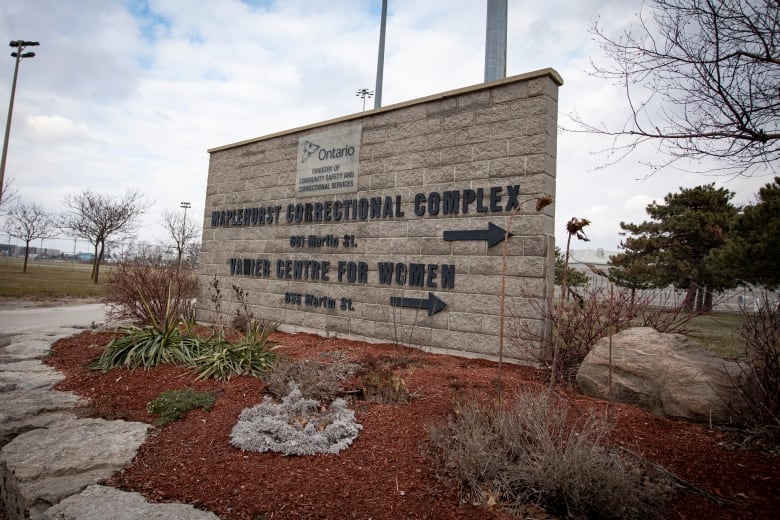'They're petri dishes for COVID-19': Advocates call for decarceration, vaccination of inmates
New report finds increased incarceration rates, variants of concern spreading in Canadian prisons

One year since the first confirmed case of COVID-19 in an Ontario jail, a new report by the Canadian Civil Liberties Association (CCLA) shows issues like overcrowding persist, and the spread of variants of concern mean outbreaks are only getting worse.
On Saturday, protesters gathered outside Maplehurst Correctional Complex in Milton, Ont., a facility that's been particularly hard-hit by COVID-19, to call for better protection for inmates.
"These are packed institutions, they're petri dishes for COVID-19," said Rajean Hoilett who attended the protest.
Hoilett is with the Toronto Prisoners' Rights Project, a grassroots organization of researchers, students, front-line workers and people with lived experience inside prisons who work to educate the public about the harms of incarceration.

Throughout the pandemic, the group has demanded that the provincial government take immediate action to protect inmates from the virus.
"Prisoners are folks who are often living with underlying health conditions, these are the people in our community that if they get this disease, will have their lives either ended or uprooted."
He said prisoners on the inside have told the group that conditions continue to deteriorate in Ontario correctional facilities.
"We're having folks who are not given masks, guards are coming into the cells without masks. It's already impossible to socially distance," he said.
Over 7,000 infections linked to prisons since March 2020: report
In March of last year, the first prisoner to test positive for the novel coronavirus in a Canadian prison was detected at Toronto South Detention Centre, the report says. Since then, it goes on, more than 7,000 cases of COVID-19 have been linked to Canadian prisons, 5,000 of which are among prisoners.
The report, released on Saturday by the CCLA as part of its Prison Pandemic Partnership — which tracks the spread of COVID-19 in provincial-territorial and federal prisons across Canada — shows crowding, increased cases of variants of concern and a lack of vaccinations for inmates are contributing to the spike in prison outbreaks across the country.
It found incarceration rates in Ontario, which sat at 5,811 prisoners in June 2020, came back up to near pre-pandemic numbers to 7,111 in March 2021.

"In the first wave of the pandemic, we saw a 30 per cent reduction here in Ontario of all of these jails," said Hoilett, pointing to the province's release of some inmates to combat overcrowding of prisons at the start of the pandemic.
"They've abandoned that strategy. We started to see numbers go back up and it's really just led to widespread outbreaks. We've just been hearing week after week … a new outbreak in a new jail."
The most recent outbreak was declared at Toronto South Detention Centre, which reported 70 cases of COVID-19 on Tuesday, of which 36 are linked to a variant of concern, according to the city's public health agency.
The cases follow an earlier outbreak in December at the same facility when 54 inmates tested positive for COVID-19.
No clear vaccination plan for inmates, advocates say
Hoilett said the government has neglected to make any definitive or clear plans to vaccinate prisoners, something he said would be met by outrage if it were happening to other vulnerable facilities such as long-term care homes.
"We've heard folks like Doug Ford say some reprehensible things about trying to deny vaccines to prisoners simply because they're in prison," he said.
"It's that kind of racist thinking, that kind of dehumanizing thinking that has a lot of us worried about what will happen as the pandemic and the new variants continue to spread."
In a statement to CBC News, the Ministry of the Solicitor General says it is working to keep people inside facilities safe during COVID-19, having added new measures such as testing and screening for all new inmates and ensuring they're isolated from the general public inside for 14 days.
In terms of vaccinations, the ministry said that based on direction and local considerations, some public health units have begun vaccinating inmates and correctional staff at their local correctional facilities this month.
'Prisons and jails are part of our community,' expert says
The government has not released more details on the vaccination plan for inmates, which experts say is concerning.
Kevin Walby, associate professor of criminal justice at the University of Winnipeg and one of the authors of the CLCA report, says as Ontario enters what many health experts and infectious disease specialists in the province are calling a third wave, vaccinations for inmates must be prioritized.
"I'm not sure that we are paying enough attention to congregate settings right now as we enter the third wave … prisons and jails are definitely an overlooked setting of this type."
He said that the prison and jail institutions are mandated to keep the people who are incarcerated safe. He also said that any time COVID-19 accelerates in congregate settings, it can spill out into the community.
"A lot of times in Canada, we treat people who are criminalized, who are imprisoned, who are behind bars as second-class citizens, and we treat them in ways that are often inhumane. And this is a big problem."
Walby said the group is calling on all levels of government in Canada to decarcerate some inmates and allow them to complete their sentences in the community to curb the crowding in prisons as well as to prioritize inmates in their vaccination plans.
"Let's make vaccinations at all congregate settings a priority — including prisons and jails because we know that prisons and jails are part of our community."
Advocates say they will keep rallying until inmates are properly protected.
With files from Farrah Merali and Derick Deonarain